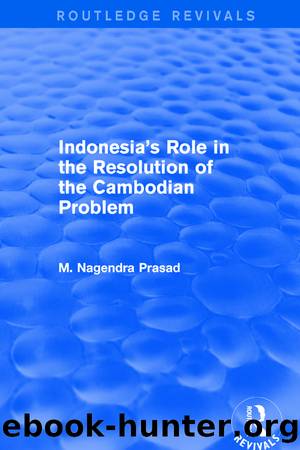Indonesia's Role in the Resolution of the Cambodian Problem by M Nagendra Prasad

Author:M Nagendra Prasad [Prasad, M Nagendra]
Language: eng
Format: epub
Tags: Social Science, General, Sociology
ISBN: 9781351756747
Google: Qx8uDwAAQBAJ
Goodreads: 35866974
Publisher: Routledge
Published: 2017-07-12T00:00:00+00:00
4 Jakarta Informal Meetings, 1988â1989
Jakartaâs untiring efforts at finding a peaceful solution to the Kampuchean question had profound influence on the parties concerned which, though hesitated initially, approved of the âCocktail Partyâ framework ultimately. Besides the change in the attitude of the major powers, the perseverance of the ASEAN and other international developments brightened the prospects of the resolution of the Kampuchean problem. For their part, the major powers as Thai Prime Minister Prem Tinsulanond pointed out, were making efforts âto mitigate their international rivalries in order to turn to economic expansionâ1 and felt the need to pursue a âpolicy of cooperationâ instead of a âpolicy of confrontationâ. The impact of this was seen in the adoption of a flexible attitude towards regional conflicts. Especially, the suppleness of Gorbachevâs peace initiatives paved the way for the âUSSR-PRC rapprochementâ, which in turn fostered a new geo-political calculus in Indochina and pressurised Hanoi to work for an early resolution of the Cambodian problem by withdrawing its troops from Cambodia. The PRC could not but soften its attitude and prevail upon its protege Khmer Rouge, to extend its cooperation in the peace process. For want of an alternative, the Khmer Rouge, hitherto preoccupied with the policy of âbleeding Vietnam whiteâ so that Hanoi âwill meet its Vietnamâ in Kampuchea, consented to taking part in the âCocktail Paryâ2 which was also called Jakarta Informal Meeting (JIM). Nonetheless, Hun Sen had pointed out the inherent difficulty in contemplating peace after excessive bloodshed.3
As the congenial environment was beginning to prevail, certain events which threatened to undermine the proposed JIM were noticed. In a Joint Statement4 issued on July 3, 1988 exclusively on the JIM, the ASEAN Foreign Ministers, while emphasising âthe importance of the upcoming JIM as a focal point in the search for the long-awaited political settlement of the Kampuchean problemâ, expressed âASEANâs full support for the Jakarta Informal Meeting which has as its objective the bringing together of the parties concerned to try to resolve the Kampuchean problemâ. Welcoming the inclination of Vietnam and all Khmer factions to participate in the JIM, the ASEAN Foreign Ministers expressed hope that âVietnamâs and Kampuchean factionsâ active involvement and positive contribution would serve to advance the cause of peace in Kampucheaâ. Again, in a Joint Communique issued two days later at the end of the 21st ASEAN Ministerial Meeting in Bangkok, the ASEAN Foreign Ministers called on the four Khmer factions and Vietnam âto support, participate and endeavour in making the projected Jakarta Informal Meeting a successâ.5 The ASEAN Joint Communique had sparked much debate and disagreement. The Indochina states and Vietnam in particular, misunderstood and misinterpreted the ASEAN Foreign Ministersâ call. They felt that ASEAN insisted on Vietnamâs participation in the first phase of the informal talks itself. At their extraordinary conference held on July 11, 1988 in Phnom Penh, the Indochinese Foreign Ministers, while expressing their âreadinessâ to attend the proposed JIM talks, pointed out that the ASEAN statesâ desire that the SRV ought to
Download
This site does not store any files on its server. We only index and link to content provided by other sites. Please contact the content providers to delete copyright contents if any and email us, we'll remove relevant links or contents immediately.
The European Opportunity by Felipe Fernández-Armesto(568)
The European History Highway: A Guide to Internet Resources by Dennis A. Trinkle Scott A. Merriman(534)
Morgan Kaufmann Digital Watermarking and Steganography by Ingemar Cox Matthew Miller Jeffrey Bloom Jessica Fridrich Ton(528)
The Seven Wonders of the Ancient World by Michael Denis Higgins(518)
Hyperculture by Byung-Chul Han(501)
European Security in a Global Context by Thierry Tardy(501)
European Security without the Soviet Union by Stuart Croft Phil Williams(501)
The Routledge companion to Christian ethics by D. Stephen Long Rebekah L. Miles(496)
Get Real with Storytime by Julie Dietzel-Glair & Marianne Crandall Follis(443)
Hudud Al-'Alam 'The Regions of the World' - a Persian Geography 372 A.H. (982 AD) by V. V. Minorsky & C. E. Bosworth(436)
Gorbachev And His Generals by William C. Green(427)
Tibetan Studies in Comparative Perspective by Chih-yu Shih Yu-Wen Chen(426)
Governance, Growth and Global Leadership by Espen Moe(417)
How Languages Are Learned 5th Edition by Patsy M Lightbown;Nina Spada; & Nina Spada(405)
CliffsNotes on Fitzgerald's The Great Gatsby by Kate Maurer(398)
The Oxford History of the World by Fernández-Armesto Felipe;(388)
The Egyptian Economy, 1952-2000 by Khalid Ikram(376)
Oral Poetry and Narratives from Central Arabia: The Poetry of Ad-Dindan : A Bedouin Bard in Southern Najd (Studies in Arabic Literature, Vol 17) (English and Arabic Edition) by P. M. Kupershoek P. Marcel Kurpershoek(365)
The Oxford Handbook of the Incas by Sonia Alconini(364)
